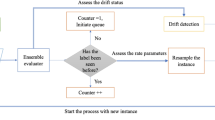Abstract
Recently, there has been growing interest in fairness considerations in Artificial Intelligence (AI) and AI-based systems, as the decisions made by AI applications may negatively impact individuals and communities with ethical or legal consequences. Indeed, it is crucial to ensure that decisions based on AI-based systems do not reflect discriminatory behavior toward certain individuals or groups. The development of approaches to handle these concerns is an active area of research. However, most existing methods process the data in offline settings and are not directly suitable for online learning from evolving data streams. Further, these techniques fail to take the effects of data skew, or so-called class imbalance, on fairness-aware learning into account. In addition, recent fairness-aware online learning supervised learning approaches focus on one sensitive attribute only, which may lead to subgroup discrimination. In a fair classification, the equality of fairness metrics across multiple overlapping groups must be considered simultaneously. In this paper, we address the combined problem of fairness-aware online learning from imbalanced evolving streams, while considering multiple sensitive attributes. We introduce the Multi-Sensitive Queue-based Online Fair Learning (MQ-OFL) algorithm, an online fairness-aware approach, which maintains valid and fair models over evolving stream. MQ-OFL changes the training distribution in an online fashion based on both stream imbalance and discriminatory behavior of the model evaluated over the historical stream. We compare our MQ-OFL method with state-of-art studies on real-world data sets, and present comparative insights on the performance.
Access this chapter
Tax calculation will be finalised at checkout
Purchases are for personal use only
Similar content being viewed by others
References
Bifet, A., Gavaldà, R.: Adaptive learning from evolving data streams. In: Adams, N.M., Robardet, C., Siebes, A., Boulicaut, J.-F. (eds.) IDA 2009. LNCS, vol. 5772, pp. 249–260. Springer, Heidelberg (2009). https://doi.org/10.1007/978-3-642-03915-7_22
Branco, P., Torgo, L., Ribeiro, R.: A survey of predictive modeling on imbalanced domains. ACM Comput. Surv. (CSUR) 49(2), 1–50 (2016)
Buolamwini, J., Gebru, T.: Gender shades: intersectional accuracy disparities in commercial gender classification. In: Conference on Fairness, Accountability and Transparency, pp. 77–91. PMLR (2018)
Domingos, P., Hulten, G.: Mining high-speed data streams. In: Proceedings of the sixth ACM SIGKDD International Conference on Knowledge Discovery and Data Mining, pp. 71–80 (2000)
Sadeghi, F., Viktor, H.L.: Online-mc-queue: learning from imbalanced multi-class streams. In: Proceedings of the Third International Workshop on Learning with Imbalanced Domains: Theory and Applications, pp. 21–34. PMLR (2021)
Fish, B., Kun, J., Lelkes, A.: A confidence-based approach for balancing fairness and accuracy. In: Proceedings of the 2016 SIAM International Conference on Data Mining, pp. 144–152. Society for Industrial and Applied Mathematics (2016)
Gomes, H.M., Read, J., Bifet, A., Barddal, J.P., Gama, J.: Machine learning for streaming data: state of the art, challenges, and opportunities. ACM SIGKDD Explor. Newsl. 21(2), 6–22 (2019)
Hoeffding, W.: Probability inequalities for sums of bounded random variables. In: Fisher, N.I., Sen, P.K. (eds.) The collected works of Wassily Hoeffding, Springer, New York, pp. 409–426 (1994). https://doi.org/10.1007/978-1-4612-0865-5_26
Howard, A., Borenstein, J.: The ugly truth about ourselves and our robot creations: the problem of bias and social inequity. Sci. Eng. Ethics 24(5), 1521–1536 (2018)
Iosifidis, V., Ntoutsi, E.: \(\sf FABBOO\) - online fairness-aware learning under class imbalance. In: Appice, A., Tsoumakas, G., Manolopoulos, Y., Matwin, S. (eds.) DS 2020. LNCS (LNAI), vol. 12323, pp. 159–174. Springer, Cham (2020). https://doi.org/10.1007/978-3-030-61527-7_11
Iosifidis, V., Tran, T.N.H., Ntoutsi, E.: Fairness-enhancing interventions in stream classification. In: Hartmann, S., Küng, J., Chakravarthy, S., Anderst-Kotsis, G., Tjoa, A.M., Khalil, I. (eds.) DEXA 2019. LNCS, vol. 11706, pp. 261–276. Springer, Cham (2019). https://doi.org/10.1007/978-3-030-27615-7_20
Kearns, M., Neel, S., Roth, A., Wu, Z.: Preventing fairness gerrymandering: auditing and learning for subgroup fairness. In: International Conference on Machine Learning, pp. 2564–2572. PMLR (2018)
Kearns, M., Neel, S., Roth, A., Wu, Z.: An empirical study of rich subgroup fairness for machine learning. In: Proceedings of the Conference on Fairness, Accountability, and Transparency, pp. 100–109 (2019)
Kohavi, R., Becker, B.: Census income data set (1996). https://archive-beta.ics.uci.edu/ml/datasets/adult
Larson, J., Mattu, S., Kirchner, L., Angwin, J.: Propublica compas risk assessment data set (2016). https://github.com/propublica/compas-analysis
Mehrabi, N., Morstatter, F., Saxena, N., Lerman, K., Galstyan, A.: A survey on bias and fairness in machine learning. ACM Comput. Surv. (CSUR) 54(6), 1–35 (2021)
Montiel, J., Read, J., Bifet, A., Abdessalem, T.: Scikit-multiflow: a multi-output streaming framework. J. Mach. Learn. Res. 19(72), 1–5 (2018)
Moro, S., Cortez, P., Rita, P.: Bank marketing data set (2014). https://archive.ics.uci.edu/ml/ datasets/bank+marketing
Ortíz Díaz, A., et al.: Fast adapting ensemble: a new algorithm for mining data streams with concept drift. Sci. World J. (2015)
Pedregosa, F., et al.: Scikit-learn: machine learning in python. J. Mach. Learn. Res. 12, 2825–2830 (2011)
Yeh, I.C., Lien, C.H.: The comparisons of data mining techniques for the predictive accuracy of probability of default of credit card clients. Exp. Syst. Appl. 36(2), 2473–2480. (2009). https://archive.ics.uci.edu/ml/datasets/default+of+credit+card+clients
Zhang, W., Bifet, A.: Feat: a fairness-enhancing and concept-adapting decision tree classifier. In: International Conference on Discovery Science, pp. 175–189. Springer, Cham (2020)
Zhang, W., Ntoutsi, E.: Faht: an adaptive fairness-aware decision tree classifier. arXiv preprint (2019). arXiv:1907.07237
Author information
Authors and Affiliations
Corresponding author
Editor information
Editors and Affiliations
Rights and permissions
Copyright information
© 2022 The Author(s), under exclusive license to Springer Nature Switzerland AG
About this paper
Cite this paper
Sadeghi, F., Viktor, H. (2022). MQ-OFL: Multi-sensitive Queue-based Online Fair Learning. In: Pascal, P., Ienco, D. (eds) Discovery Science. DS 2022. Lecture Notes in Computer Science(), vol 13601. Springer, Cham. https://doi.org/10.1007/978-3-031-18840-4_20
Download citation
DOI: https://doi.org/10.1007/978-3-031-18840-4_20
Published:
Publisher Name: Springer, Cham
Print ISBN: 978-3-031-18839-8
Online ISBN: 978-3-031-18840-4
eBook Packages: Computer ScienceComputer Science (R0)




